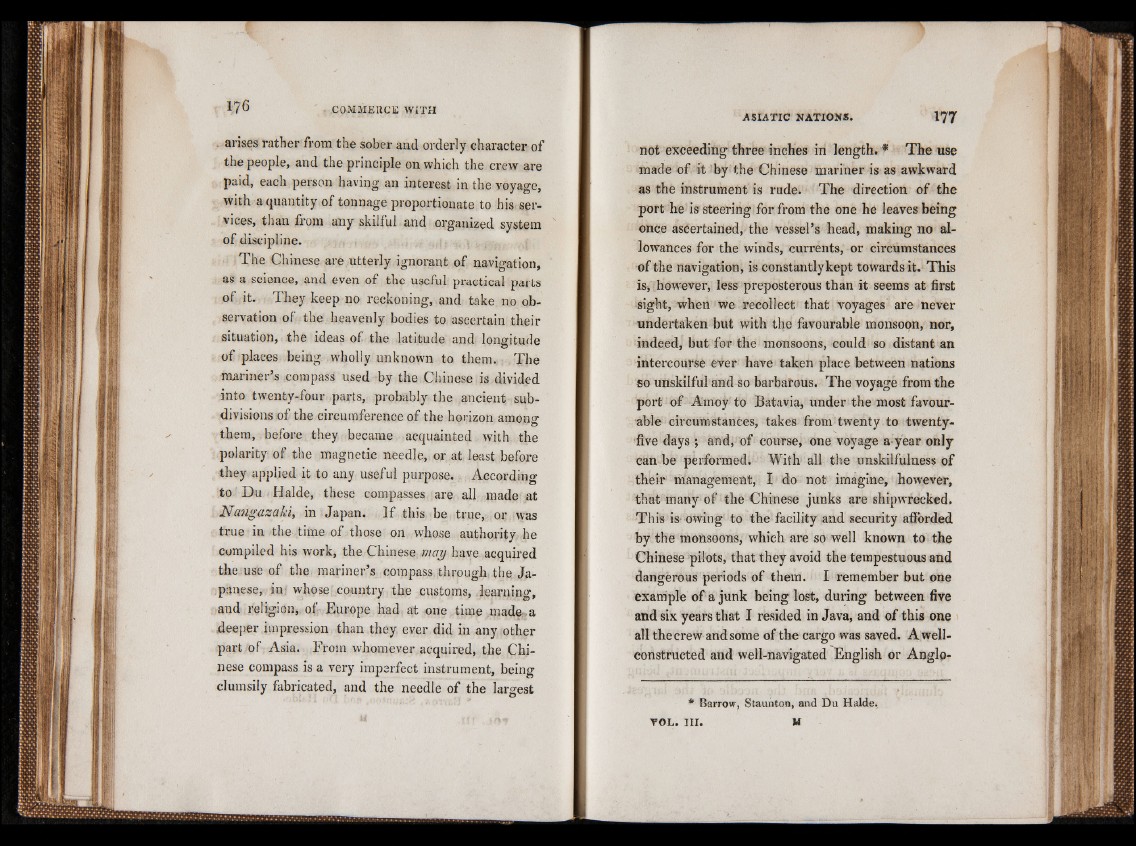
. arises rather from the sober and orderly character of
the people, and the principle on which the crew are
paid, each person having an interest in the voyage,
with a quantity of tonnage proportionate to his services,
than from any skilful and organized system
of discipline.
The Chinese are utterly ignorant of navigation,
as a science, and even of the useful practical parts
of it. They keep no reckoning, and take no observation
of' the heavenly bodies to ascertain their
situation, the ideas of the latitude and longitude
of places being wholly unknown to them. The
mariner’s compass used by the Chinese is divided
into twenty-four parts, probably the ancient subdivisions
of the circumference of the horizon amono-
them, before they became acquainted with the
polarity of the magnetic needle, or at least, before
they applied it to any useful purpose. . According
to Du Halde, these compasses are all made at
Nangazaki, in Japan. If this be true, or was
true in the time of those on whose authority he
compiled his work, the Chinese may have acquired
the use of the mariner’s compass through the. Japanese,
in? whose country the customs, learning,
and religion, of Europe had at one time made,,a
deeper impression than they, ever did in any other
part of Asia. From whomever acquired, the Chinese
compass is a very imperfect instrument, being
clumsily fabricated, and the needle of the largest
not exceeding three inches in length. * The use
made of it by the Chinese mariner is as awkward
as the instrument is rude. The direction of the
port he is steering for from the one he leaves being
once ascertained, the vessel’s head, making no allowances
for the winds, currents, or circumstances
of the navigation, is constantly kept towards it. This
is, however, less preposterous than it seems at first
sight, when we recollect that voyages are never
undertaken but with the favourable monsoon, nor,
indeed, but for the monsoons, could so distant an
intercourse ever have taken place between nations
so unskilful and so barbatous. The voyage from the
port of Amoy to Batavia, under the most favourable
circumstances, takes from twenty to twenty-
five days ; and, of course, one voyage a-year only
can be performed. With all the unskilfulness of
their management, I do not imagine, however,
that many of the Chinese junks are shipwrecked.
This is-owing to the facility and security afforded
by the monsoons, which are so well known to the
Chinese pilots, that they avoid the tempestuous and
dangerous periods of them. I remember but one
example of a junk being lost, during between five
and six years that I resided in Java, and of this one
all the crew and some of the cargo was saved. A well-
constrUcted and well-navigated English or Anglp-
* Barrow, Staunton, and Du Halde,
VOL. III. M